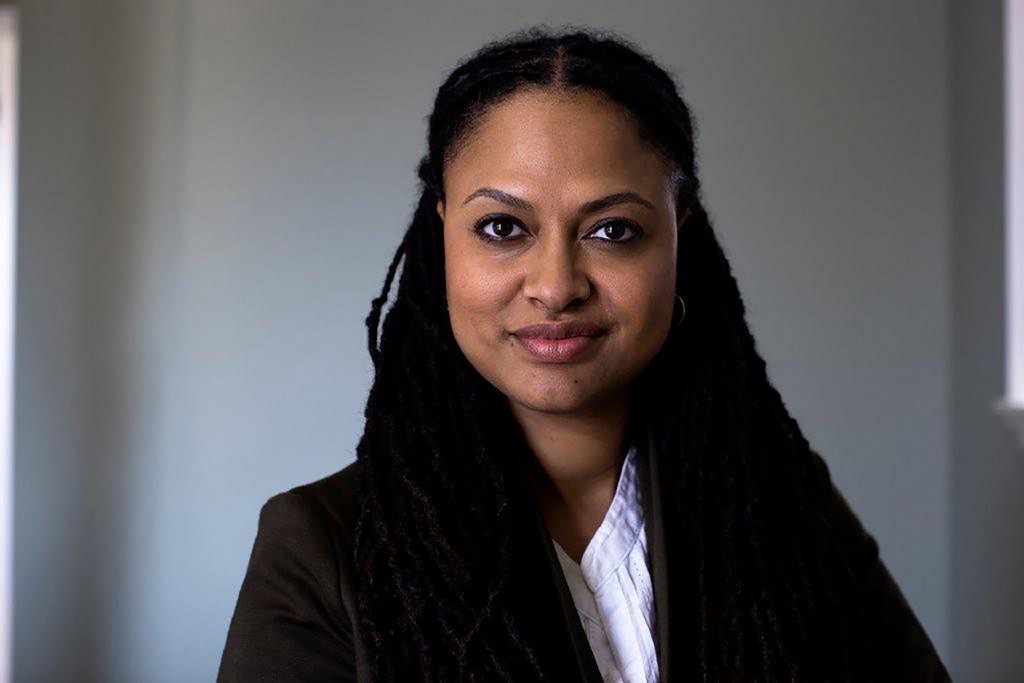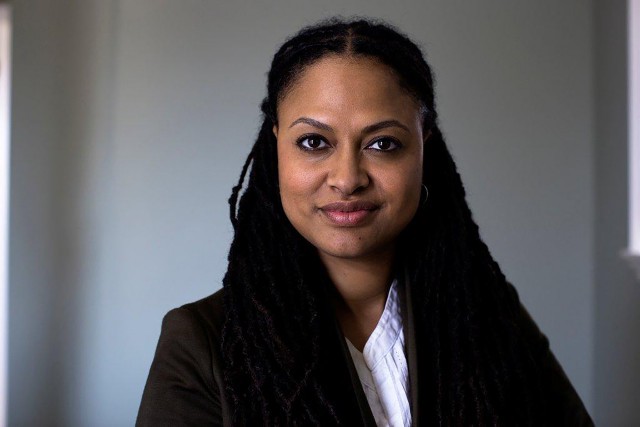The Quiet Revolution of Ava DuVernay
by Kerensa Cadenas


The beginning of a new year is full of potential — new jobs, loves, attitudes, inspirations. In the words of Ava DuVernay, inspiration is an opportunity to “blossom in all kinds of areas.”
DuVernay’s own Hollywood story echoes her own words. Before she began directing, she worked as a film marketer and publicist for 14 years. Her first film, a documentary about hip-hop called This is the Life received critical acclaim. In 2010 she directed and wrote her first narrative feature, I Will Follow. Since then, she’s been on a roll with the Sundance-winning Middle of Nowhere, directing Venus VS. for ESPN, and the very important “Vermont Is for Lovers, Too” episode of Scandal. She was the first black woman director to win the Best Director award at Sundance and now she is the first to be nominated for a Golden Globe.
I’ve long loved DuVernay’s work; from the stellar, touching Middle of Nowhere to her short film for Miu Miu, The Door, which stars a heartbroken Gabrielle Union leaning on her friends in her time of need while wearing the most beautiful clothes. Even at a brief nine minutes, The Door showcases what makes DuVernay such an important, vital voice as a director: she has a knack for capturing the quiet moments in the midst of chaos and turmoil.
That’s what makes Selma stand out.
Selma chronicles the three-month period where Dr. Martin Luther King Jr. (David Oyelowo) worked to secure equal voting rights with a series of marches from Selma to Montgomery. The marches ultimately led to President Lyndon Johnson (Tom Wilkinson) signing the Voting Rights Act of 1965.
In other hands, Selma could have been a run of the mill biopic — following a tremendous man who made tremendous changes. But DuVernay makes Martin Luther King Jr. more than the myth — she makes him human. One of the best parts of the film is its humanity. DuVernay looks at Selma as a story of the community and all the people who were integral to making change happen, showing the quiet moments in between the escalating tension. The film is, sadly, too relevant in light of police aggression and unarmed black men being killed throughout the country. But it’s a film that shows the importance of organizing, speaking out, protesting, and the dialogue it creates — something we greatly need right now.
I talked to DuVernay about Selma, Ferguson, telling women’s stories, and Oprah (duh).
I saw Selma last month and it is incredible. How has this experience with the film’s release, critical success, and nominations been for you? Has it felt surreal?
It’s a beautiful time. We made something, we put our all into it. Truly a collaborative experience with Oprah, David, my editor Spencer Averick, my cinematographer Bradford Young, Morgan and Jason on music, Ruth Carter on costumes. It’s a family that came together and really gave everything we had. For people to be seeing the film, for us to be critically where we are — -100% on Rotten Tomatoes — -to be getting so much feedback from people in theaters about how it’s making them feel, all the conversation going on around the film, people wanting to read history and learn for themselves…it’s exactly what you want.
In light of everything that’s been happening in Ferguson, Eric Garner, Ezell Ford — it’s incredibly and sadly relevant seeing how deeply rooted racism is in this country. What do you think that Selma has been showing audiences, especially those who may have previously cast a blind eye to such matters?
Hopefully the film can provide a base of knowledge, but it’s a film. It’s not a documentary or a book, but it’s a base of knowledge for folks who maybe never considered these events seriously. [For] people who didn’t know the details of Selma, it could illuminate some of the unrest and the social action and awareness around police aggression and the shooting of unarmed citizens that’s happening right now. It could give some historical context to it. That this is not new, that this is an ongoing problem that’s decades long, and maybe it’s time we spent applying different tactics to curb some of what’s wrong.
I can’t say what I want it to do because I want it to do what it’s going to do for each individual person. I talked to a woman who told me the biggest thing she took out of it was how to talk to her husband about an issue she wanted to talk to him about based on Coretta and Martin’s storyline. It’s something I could have never planned. As a storyteller you just have to tell the story and allow each person to bring themselves to it and find themselves in it.
Something that I really love about your work, which you can see in Middle of Nowhere, or in your short The Door, is that so much of it focuses on telling women’s stories. Selma’s focus is greater than just solely focusing on Martin Luther King Jr., you spend time focusing on the women who were involved. Why is it important to show these women’s stories as opposed to solely him?
You aren’t telling the full story if there isn’t a woman included, you know? We know that. We know that women make up half of the population of the planet, so you are really making an effort to not include them. That’s just not something that even makes sense to me and I like my films to make sense.
Beyond that, we know that the actions of men [in the Civil Rights Movement] have been historically amplified, but very strong, very smart, very strategic, nurturing, nourishing women played an equal and as important part. It was just not an option that they not be a part of the story.
When I saw the film you did a Q&A;, and what stood out to me was when you said that you had never considered directing something on such an epic scale. You said you had never imagined it for yourself. I thought about your response in terms of women, art and the idea of imposter syndrome. Can you talk about that and how it concerns women working in the film industry?
My personal experience was that I had started telling very interior, intimate stories and had a lot of those stories to tell. And it felt like I had a great amount of autonomy and independence being able to tell those stories on any budget, at any time I wanted, and I did not feel like I wanted to trade that at any point for any kind of oversight or anyone looking over my shoulder saying “don’t say that, don’t say this.” It’s very rare to be able to have the opportunity like the one I had where you have $20 million dollars and yet your voice is being allowed to remain intact about issues that are important to you. It’s rare, it’s not something I saw happening, and I have plenty of stories to tell on a certain budget and at a certain size. This was never something I wrestled with — that many filmmakers wrestle with — “oh, this budget has to be bigger than the next.” I really wrestle with consistency and momentum.
One of my favorite filmmakers is Lynn Shelton — a woman filmmaker who makes a certain size of film every year. She’s consistently done that and been able to amplify her voice and tell her stories at a certain size and she hasn’t stopped since she started. Any stops were of her own choosing because she’s gotten to a sweet spot she’s been able to establish. That’s what I was hoping to do. Selma changed that idea with a really extraordinary and rare opportunity to think about the story on a larger canvas.
Was directing Selma a different experience from your other films because of the larger scale?
I didn’t approach the scenes of friends, family, marriage and interior moments of despair or introspection any differently than I did in any of my previous films. Yes, in my previous stuff I didn’t have tear gas, horses, bridges or any of that — -people weren’t being destroyed by bombs or being shot. There’s some pieces of my skillset that were easily applicable to the film and there were others where I had to push and grow. I’m happy with what we did, what we had and looking to continue to blossom in all kinds of areas.
Who are some women that inspire you and have made a difference in your life?
Well, the first person that comes to mind is Oprah Winfrey. To be able to say that I just got off the phone with her five minutes ago…every time I speak to her, sometimes I feel like I’m the luckiest person and that I’m getting my own private personal Oprah Winfrey Show. She’s telling me the things she’s really heard and learned, passing things along to me. What a privilege! What an honor! Butjust being able to ask her questions and look at her body of work as an actor, producer, personality, publisher, writer, leader — she is a very rare individual that I’m able to learn from up close. That’s something I never imagined before two years ago and it’s something I thank my lucky stars for every single day.
Kerensa Cadenas is a writer based in Los Angeles. She always wants to talk about weird snacks, Drake and, if she’s being honest with herself, the emotional truth telling of Taylor Swift.
Photo by Brigitte Lacombe.